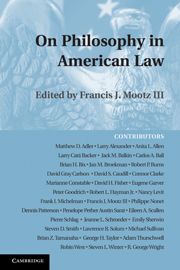Book contents
- Frontmatter
- Contents
- Introduction
- PART I KARL LLEWELLYN AND THE COURSE OF PHILOSOPHY IN AMERICAN LAW
- PART II PHILOSOPHICAL PERSPECTIVES ON LAW
- PART III AREAS OF PHILOSOPHY AND THEIR RELATIONSHIP TO LAW
- PART IV PHILOSOPHICAL EXAMINATIONS OF LEGAL ISSUES
- PART V LAW, RHETORIC, AND PRACTICE THEORY
- PART VI QUESTIONING THE RELATIONSHIP BETWEEN PHILOSOPHY AND AMERICAN LAW
- PART VII COMMENTARIES
- 32 Optimism and Pessimism in American Legal Philosophy
- 33 This Jurisprudential Moment
- 34 Fresh Looks, Philosophy-in-Action, and American Law
- Contributors and Selected Bibliography
- Name Index
- References
32 - Optimism and Pessimism in American Legal Philosophy
Published online by Cambridge University Press: 31 July 2009
- Frontmatter
- Contents
- Introduction
- PART I KARL LLEWELLYN AND THE COURSE OF PHILOSOPHY IN AMERICAN LAW
- PART II PHILOSOPHICAL PERSPECTIVES ON LAW
- PART III AREAS OF PHILOSOPHY AND THEIR RELATIONSHIP TO LAW
- PART IV PHILOSOPHICAL EXAMINATIONS OF LEGAL ISSUES
- PART V LAW, RHETORIC, AND PRACTICE THEORY
- PART VI QUESTIONING THE RELATIONSHIP BETWEEN PHILOSOPHY AND AMERICAN LAW
- PART VII COMMENTARIES
- 32 Optimism and Pessimism in American Legal Philosophy
- 33 This Jurisprudential Moment
- 34 Fresh Looks, Philosophy-in-Action, and American Law
- Contributors and Selected Bibliography
- Name Index
- References
Summary
Pity the legal philosopher. Those us of who are academics must to some extent justify our professional existence, insulated as we are from the type of market forces and ongoing performance reviews that most employees are subject to. For academics who help to train professionals – as law professors do – that justification is made somewhat easier by the fact that our students will turn (however indirectly and imperfectly) the doctrinal knowledge that we impart to them in the classroom into doctrinal practices in the outside world. Students of property or of tort law, for example, will to some extent rely on the concepts learned and skills acquired in the classroom in making or interpreting the law as participants in the legal system. Similarly, property or tort scholars can through their writings seek (however indirectly and imperfectly) to influence legal decision makers on the future direction of the law.
But what of jurisprudes? How do they justify their existence? Obviously, there is no practice of jurisprudence as such. There are no causes of action, no claims, no points of legal doctrine that can be passed on from teacher to student. It is possible (at least in theory) that students turned legal actors will bring to bear on their practices concepts related, for example, to pragmatism or natural law or consequentialism that they may have picked up in a jurisprudence class, but the link between knowledge and practice seems considerably more attenuated in jurisprudence than in just about any other course in the law school curriculum.
- Type
- Chapter
- Information
- On Philosophy in American Law , pp. 273 - 278Publisher: Cambridge University PressPrint publication year: 2009



